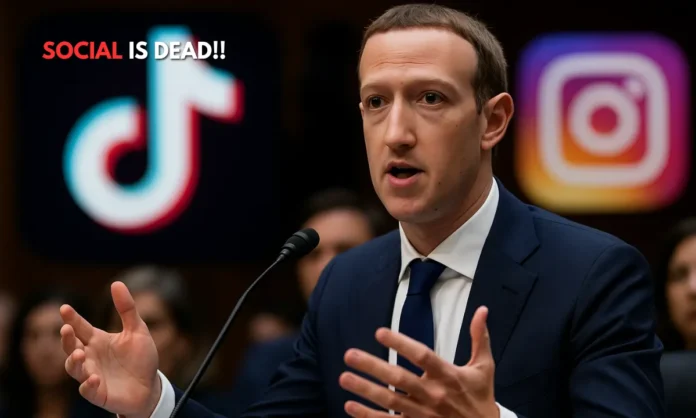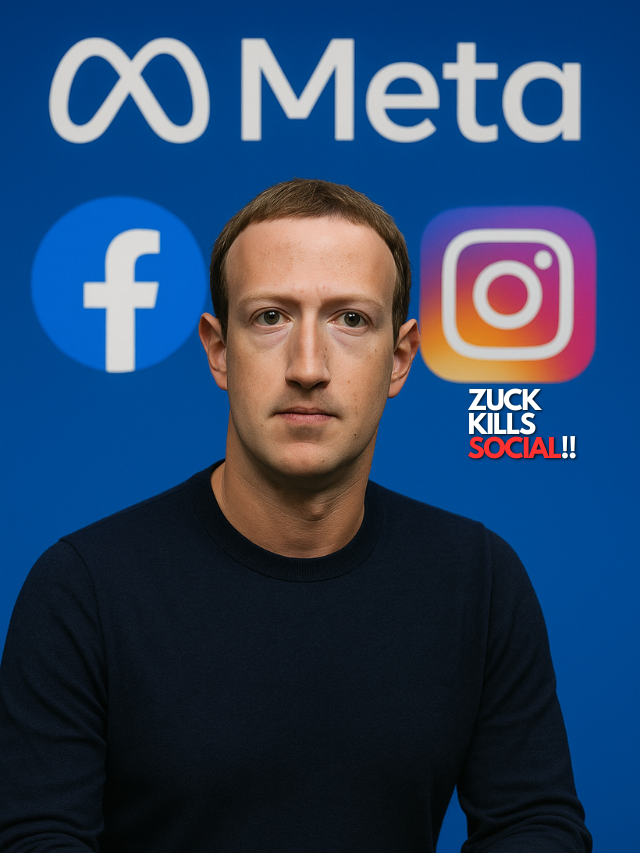SUMMARY
- Meta CEO tells FTC the age of “social” media is over; entertainment and AI are the new centerpieces.
- Time spent on posts from friends drops sharply on Facebook and Instagram, per Meta’s own data.
- Zuckerberg argues antitrust concerns are outdated in a fragmented, TikTok-dominated landscape.
The Platform Is the Product: Welcome to the Age of Broadcast Social
In what may be the most defining statement of the tech decade, Mark Zuckerberg has declared before the Federal Trade Commission that the golden age of social media—as a space for interpersonal connection—is over. Testifying in an ongoing antitrust hearing that could reshape Meta’s future, Zuckerberg didn’t just defend the company’s empire; he redefined it. Platforms once built around friendships and family ties are now massive media engines. The “social” in social media, he argued, is being outpaced by something else: AI-generated entertainment, influencer content, and algorithmic mass engagement.
This shift is not speculative—it’s statistical. Zuckerberg’s testimony revealed that posts from friends now account for just 17% of time spent on Facebook (down from 22% in 2021) and a mere 7% on Instagram (previously 11%). The gravity has shifted from relationships to reach. From connecting to consuming.
But while Zuckerberg’s statement may be aimed at weakening antitrust scrutiny, it also lays bare a cultural pivot that affects everyone: your digital experience is no longer about your circle. It’s about the feed.
Here is the full video from Mark Zuckerberg announcing the end of censorship and misinformation policies.
— Saagar Enjeti (@esaagar) January 7, 2025
I highly recommend you watch all of it as tonally it is one of the biggest indications of "elections have consequences" I have ever seen pic.twitter.com/aYpkxrTqWe
Meta’s New Pitch: From Friends to Feeds
- Zuckerberg says Meta now focuses on “entertainment and learning about the world.”
- FTC’s antitrust case centers on Meta’s acquisitions of Instagram and WhatsApp.
- Meta counters by framing TikTok, YouTube, and iMessage as equals in the digital battlefield.
At the heart of the FTC’s lawsuit is a classic antitrust accusation: that Meta used acquisitions like Instagram and WhatsApp to quash competition and dominate social media. But Zuckerberg, master of narrative shifts, painted a different picture entirely. The FTC’s view, he argued, relies on an outdated map of the digital world. The borders between platforms have blurred. Everyone—from TikTok to YouTube to even Apple’s iMessage—is now in the business of broadcast content, AI-powered discovery, and algorithmic attention capture.
To illustrate this, Meta presented a slide showing its platforms alongside TikTok and YouTube—not as monopolists, but as rivals in a new race: not for friendship graphs, but for entertainment ecosystems.
It’s a compelling frame—and one with legal implications. If there’s no longer a single “social media” market, then there’s no monopoly to prosecute.
What the Metrics Don’t Lie About: The Death of Connection
- Facebook and Instagram now prioritize mass content over friend updates.
- Engagement has moved from interpersonal to parasocial—users follow influencers, not peers.
- Social media now mimics television more than town halls.
Zuckerberg’s pivot isn’t just a courtroom strategy. It’s a reflection of something deeper—and more disquieting—about how we use digital platforms today. The news feed, once a personalized window into your friends’ lives, is now a firehose of virality. Content from celebrities, AI bots, brands, and influencers dominates your scroll. The architecture of the platforms has changed to prioritize engagement, not authenticity.
It’s not just Meta. TikTok, YouTube Shorts, and even LinkedIn now reward content that generates mass traction over meaningful dialogue. What was once a web of people has become a broadcast arena. In this new model, users aren’t connecting with friends; they’re consuming performances.
And with that, social capital—the kind built on birthdays remembered, comments left, and photos liked—has been replaced by algorithmic relevance.
The Future Meta Imagines—and What It Forgets
- Zuckerberg says AI, content discovery, and education will define the next era.
- Critics say Meta’s shift is an evasion of responsibility for deteriorating online discourse.
- The FTC’s antitrust case could reshape how regulators interpret “dominance” in digital economies.
As Zuckerberg offers a vision of a content-rich, AI-assisted, hyper-optimized future, his critics warn of what’s being left behind. The human element—the messy, imperfect, deeply social core of the internet—is being buried under the weight of metrics. The FTC’s concern, then, isn’t just legal. It’s philosophical.
Can one company shape the emotional and informational architecture of two billion people’s lives? And if so, how should that company be governed?
Meta insists the market has moved on—that it no longer operates a monopoly because the industry has evolved. But evolution doesn’t necessarily mean progress. As the FTC weighs its options, what’s also on trial is the definition of digital community itself.
Timeline Collapse: Where Real Social Ends and Synthetic Engagement Begins
Zuckerberg’s confession signals more than a strategic pivot. It is an obituary. The digital public square we once knew—built on connection, transparency, and mutual presence—is gone. In its place, Meta and others have engineered engagement machines where interaction is synthetic, attention is the currency, and connection is optional.
Whether this shift will help Meta escape antitrust scrutiny remains to be seen. But the bigger question is whether users, in their quiet scrolling, even noticed what they lost.



